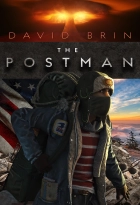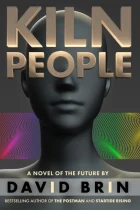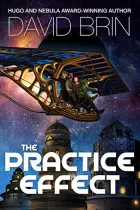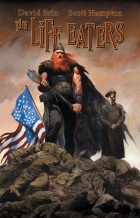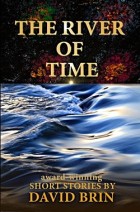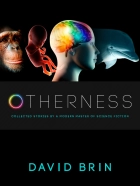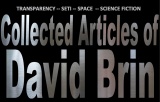A balanced and well-researched Wired article by Jason Kehe reveals the latest “yoo-hoo transmission to aliens” stunt. Of course I consider these things to be at-best dopey, with a small but significant chance of being thoughtlessly dangerous for all of humanity. Above all, to cast such noises outward, based on untested assumptions, without at least offering to discuss it first with our planet’s population and its greatest  sages? That is simply rude. Arrogant rudeness on an unprecedented scale. See my article for the Lifeboat Foundation, Shouting at the Cosmos: how SETI has taken a worrisome turn into dangerous territory.
sages? That is simply rude. Arrogant rudeness on an unprecedented scale. See my article for the Lifeboat Foundation, Shouting at the Cosmos: how SETI has taken a worrisome turn into dangerous territory.
 Put it in perspective? A cute interactive graphic lets you test out four different assumptions in the Drake Equation to estimate the number of communicating civilizations in our galaxy. (I’ve seen better… but still, this one is fun and a good introduction.)
Put it in perspective? A cute interactive graphic lets you test out four different assumptions in the Drake Equation to estimate the number of communicating civilizations in our galaxy. (I’ve seen better… but still, this one is fun and a good introduction.)
== Gettin Smarter all the time… ==
But I promised to appraise one of those Drake Equation factors today — intelligence. Is it rare? Can it be enhanced? Or possibly bestowed upon others?
Let’s start with a recent science news item. By placing a neural device in the brains of monkeys with disrupted cognitive function, researchers were able to recover and even improve the monkeys’ ability to make decisions, overcoming the effects of cocaine in select regions of the brain. Moreover, when duplicating the experiment under normal conditions, the monkeys’ performance improved beyond their previous 75% proficiency level. In other words, a kind of cognitive enhancement appears to have happened.
This got big play in the press. But, now let’s not get carried away. The prosthesis was designed to bypass a very specific type of temporary chemical debilitation in a specific region. That’s a far cry from the general brain boost proclaimed by florid news reports. Still…
… that raises the possible prospect someday of brain boosting some of the critters around us. A topic we have discussed here several times before. Now an excellent iO9 article by George Dvorsky indicates we may be at the dawn of the Uplift Era. Should we upgrade the intelligence of animals?
 From Pierre Boule to H.G. Wells, nearly all tales about ‘uplift’ of other species (to our level of intelligence) assumed that it would be done stupidly – because stupidity leads to errors and conflict, which transform any concept into an action plot! Mistakes create peril, so those authors portrayed the uplifters being callous, unwise, even vicious slave-masters. When writers do this, the plot almost writes itself.
From Pierre Boule to H.G. Wells, nearly all tales about ‘uplift’ of other species (to our level of intelligence) assumed that it would be done stupidly – because stupidity leads to errors and conflict, which transform any concept into an action plot! Mistakes create peril, so those authors portrayed the uplifters being callous, unwise, even vicious slave-masters. When writers do this, the plot almost writes itself.
What’s more challenging is to write a story that shows humanity doing something well, or at least openly, with good intentions — and yet still crafting a story filled with action and excitement, where Crichtonian errors can get discovered through vibrant criticism.
 That was the premise behind my popular series of six novels in the “Uplift Universe”… soon to be re-issued in two omnibus volumes by Orbit Books. And yes, I am aiming to re-enter that cosmos in a big way, with that long-awaited “progenitors” tale. Pretty soon I reckon.
That was the premise behind my popular series of six novels in the “Uplift Universe”… soon to be re-issued in two omnibus volumes by Orbit Books. And yes, I am aiming to re-enter that cosmos in a big way, with that long-awaited “progenitors” tale. Pretty soon I reckon.
== The Mental Ecology of Intelligence and Uplift ==
These issues are (at long last) getting serious (if rather shallow) attention from the scientific community. For example, the Cambridge Declaration on Consciousness was written by Philip Low and edited by Jaak Panksepp, Diana Reiss, David Edelman, Bruno Van Swinderen, Philip Low and Caltech’s Christof Koch. It declares the following:
“The absence of a neocortex does not appear to preclude an organism from experiencing affective states. Convergent evidence indicates that non-human animals have the neuroanatomical, neurochemical, and neurophysiological substrates of conscious states along with the capacity to exhibit intentional behaviors. Consequently, the weight of evidence indicates that humans are not unique in possessing the neurological substrates that generate consciousness. Nonhuman animals, including all mammals and birds, and many other creatures, including octopuses, also possess these neurological substrates.”
The authors go on to imply that they do not perceive a stark, decisive, qualitative difference between the consciousness of humans and of many higher animal species. Their implication is that we should consider new proposals for vesting such creatures with some level of sapient rights and respecting their current mental achievements as different, but of equivalent value to our own.
Alas, while I lean toward their general side of the spectrum, wanting more empathy toward the natural world, I find how they express that empathy to be fantastically myopic. Overblown, their declaration says nothing new. The threshold abilities of cetaceans, simians… and yes parrots, corvids, pinnipeds, even cephalopods… have all been investigated recently and we’ve been delightfully astonished by evidence showing how many animals possess impressive-if-basic mental skills.
Fascinating, indeed! Nevertheless dwelling on this positive trend is to miss the starkly more-significant significance of all this.
 What’s interesting is not how many somewhat-smart species there are on this planet, but how they cluster! With some variation (dolphins and chimps seem to be ahead by a margin) they all bump against roughly the same glass ceiling of commonly shared capabilities — at problem solving, tool use, linguistic comprehension, and so on. The more you watch crows, sea lions, parrots, octopi — and dolphins and apes — the more this confluence of similar abilities comes across as the striking salient feature.
What’s interesting is not how many somewhat-smart species there are on this planet, but how they cluster! With some variation (dolphins and chimps seem to be ahead by a margin) they all bump against roughly the same glass ceiling of commonly shared capabilities — at problem solving, tool use, linguistic comprehension, and so on. The more you watch crows, sea lions, parrots, octopi — and dolphins and apes — the more this confluence of similar abilities comes across as the striking salient feature.
That ceiling is what’s interesting! It’s as if Darwin himself stepped up and told all these diverse species and genuses: “this high you may climb, because it helped you to be agile and clever in your natural environment. But no higher! The reproductive and survival rewards for getting much smarter than that simply aren’t sufficient to drive selection across an expensive and dangerous gap. You may not cross.”
What a fascinating topic for research! Comparing creatures across such a wide range and mapping the breadth and depth and nature of that ceiling. And possibly thereby shedding light on the greatest puzzle of all. Why are we the one exception? The one breakthrough? We sappy sapiens?
Was it a confluence of experiences, trials and selections endured by bands of gregarious apes, squeezing through evolutionary bottlenecks, one after another? Or was it something like my own hypothetical process, two-way sexual selection?
Could some rare fluke explain us… and thereby help shine light on our apparent loneliness in the cosmos?
Even more thought-provoking; suppose it truly was a fluke that let just one race of bright sub-sapients crash through the ceiling, what kind of horrible bastards would we be, if we then refused to share our good fortune? If churlishly disdained to turn around and help others across the gap?
Oh but what about ourselves? Can we make ourselves smarter? Perhaps even becoming bright and wise enough to solve our vexing problems? Brilliant enough to turn this internet thing into a blessing, instead of a lobotomizing curse? Well, stay tuned.
See my article: The Flynn Effect: Are we getting smarter?
== A longer life through self-starvations? ==
One route to transcendence might be simply to live longer. After all, doesn’t experience make you wiser?

But how?
Calorie restriction (CR), a 10–40% reduced intake of a nutritious diet, is often reported as the most robust non-genetic mechanism to extend lifespan and healthspan. Effects on bacteria, fruit flies and even mice have encouraged many
in the Life-Extension or Transhumanism movements to embrace CR as a personal lifestyle, hoping for the doubling effect they perceive in animal studies. You can recognize the type, at conferences, by their “lean and hungry look.”
I have been a skeptic; not only because humans are already the Methuselahs of the mammalian order, having picked all the longevity low-hanging fruit in order to get three times the average number of heartbeats used by most mammals… but also because caloric restriction has been practiced in hundreds of ascetic monasteries across the last 4000 years. (Do you see any 300 year old monks capering around?)
See my essay: Do We Really Want Immortality?
I portray all of this a bit in my new novel EXISTENCE.
Now news from a study of CR done for the first time on a primate species. “A CR regimen implemented in young and older age rhesus monkeys at the National Institute on Aging (NIA) has not improve
== More Problems With “Intelligence” ==d survival outcomes.” Oops. Did I call that? Sorry fellows.
But to get smarter, we’ll have to learn to overcome a lot of baggage we picked up during those epochs in the caves. “The key to understanding how the modern mind works is to realize that its circuits were not designed to solve the day-to-day problems of a modern American — they were designed to solve the day-to-day problems of our hunter-gatherer ancestors. These stone age priorities produced a brain far better at solving some problems than others.” (From Evolutionary Psychology Primer, by Leda Cosmides and John Tooby).
People who ordinarily cannot detect violations of if-then rules can do so easily and accurately when that violation represents cheating in a situation of social exchange. Everywhere it has been tested (adults in the US, UK, Germany, Italy, France, Hong-Kong; schoolchildren in Ecuador, Shiwiar hunter-horticulturalists in the Ecuadorian Amazon), people do not treat social exchange problems as equivalent to other kinds of reasoning problems. Moreover, they do not behave as if they were designed to detect logical violations per se; instead, they prompt choices that track what would be useful for detecting cheaters.
 Well, well, were we speaking of getting rid of excess baggage? And did I mention “sexual selection?” Then consider this, published in The New York Times: Men, Who Needs Them? An amusing (I hope) rumination on how unnecessary the male half of the human race is becoming. A pondering that has long been mused-upon in both radical feminist science fiction and more moderate versions, like my own novel Glory Season.
Well, well, were we speaking of getting rid of excess baggage? And did I mention “sexual selection?” Then consider this, published in The New York Times: Men, Who Needs Them? An amusing (I hope) rumination on how unnecessary the male half of the human race is becoming. A pondering that has long been mused-upon in both radical feminist science fiction and more moderate versions, like my own novel Glory Season.
Or might the new “Maker Movement” lead to building replicants, even better than we near-perfect natural specimens?
How to create cyborg flesh. According to Harvard researchers, you start with a three-dimensional scaffold that encourages cells to grow around them. These scaffolds are generally made of collagen, which makes up the connective tissue in almost every animal. (Elsewhere I describe recent advances in re-growing complex tissues like a whole esophagus.) The Harvard engineers basically took normal collagen, and wove nanowires and transistors into the matrix to create nanoelectric scaffolds (nanoES). The neurons, heart cells, muscle, and blood vessels were then grown as normal, creating cyborg tissue with a built-in sensor network. Next? Go beyond sensing to communicate 2-way with the cells. ALL the cells. Directly. Yipe.
== Intelligence in the Future? ==
Hailed as the biggest breakthrough in genomics in a decade, this project explained how swathes of DNA once thought to have no purpose, actually form a complex “control panel” for our genes. Turns out the “junk DNA” had some purposes, after all! The nopn-gene sections are regulatory, and crucially important.
 Oh but then it gets mind-blowing. Big Brain futurist singularity guy John Smart has just posted a 45 min video about Chemical Brain Preservation, which might challenge cryonics among those looking for a better storage medium, to wait out the temporary hiatus between “death” and — er — a second life. That is, if it gets validated by neuroscience in coming years.
Oh but then it gets mind-blowing. Big Brain futurist singularity guy John Smart has just posted a 45 min video about Chemical Brain Preservation, which might challenge cryonics among those looking for a better storage medium, to wait out the temporary hiatus between “death” and — er — a second life. That is, if it gets validated by neuroscience in coming years.
Will this make post-death preservation less expensive, less environmentally wasteful and more withing reach of those who have been skeptical, till now? I guess I’d prefer being a pickled-plasticized brain on my grandkids’ mantel to using up kilogallons of liquid nitrogen in a fragile, frozen ossuary, never being talked about (as you would be, now and then, as a plasticized keepsake on the mantel!)
Emplace the brain/head in a unit with holo display and simple voice-response unit. (“Hey you kids! It’s getting dusty over here!) Add some oracular statements that get released by time (a la Hari Seldon). Fun for the whole (extended) family. You can leave comments at John’s blog.
Oh, John added the following personal note: “I will do my best to get the price down to where the mantlepiece fossil is an irresistible choice for the Brin household. Then if the Universe allows me a bit more longevity than you (cross fingers), I’ll come by and pay my respects. I hope to see a holoBrin pop out, identify me biometrically, and then ask me if I’m working sufficiently hard to get you back out!!”
Hrm. I will have more fierce ways of haunting than just that!
And finally, the ultimate theory… OUR LIFE AS AVATARS…. My friend Rich Terrille is interviewed about the now familiar notion that we all dwell within a simulation. Rich is a very bright guy. We’ve discussed his version of this concept and I consider it a step forward. Earlier versions by Hans Moravec in the 1990s and Stanislaw Lem in the 1970s, are of interest along the way, going back to Lao Tse’s parable of the butterfly and the Emperor. My own contributions include an essay, Could our Universe be a Fake? and a novelette from the 1990s called “Stones of Significance” which folks might find both amusing and boggling. (A Hugo nominee.)
Evidence for this notion includes the fact that we have a minimum temperature and a maximum speed and a limit to how finely you can sub-divide nature. All of those “universal traits” strike one as attempts to skimp on computational needs by the stingy owners of this simulation… I mean the handsome, intelligent, generous, kind and wonderful owners who would never think of reaching over and flicking the switch that says reboo…
 Just a few of the multitude of novels diving into divergent paths for the American Civil War include Harry Turtledove’s The Guns of the South, Terry Bisson’s Fire on the Mountain, and Ward Moore’s Bring the Jubilee. The recent, best-selling Underground Airlines by Ben H. Winters posits that the Civil War never happened and slavery persists in regions of America. Even politician Newt Gingrich has written in this genre: his novel Gettysburg, co-written with William R. Forstchen, explores how history might have unfolded if the Confederacy had won this crucial battle. In a more outlandish speculation, William Forstchen’s Lost Regiment series, beginning with Rally Cry, envisions a Civil War era Union regiment transported through time and space to an alien world.
Just a few of the multitude of novels diving into divergent paths for the American Civil War include Harry Turtledove’s The Guns of the South, Terry Bisson’s Fire on the Mountain, and Ward Moore’s Bring the Jubilee. The recent, best-selling Underground Airlines by Ben H. Winters posits that the Civil War never happened and slavery persists in regions of America. Even politician Newt Gingrich has written in this genre: his novel Gettysburg, co-written with William R. Forstchen, explores how history might have unfolded if the Confederacy had won this crucial battle. In a more outlandish speculation, William Forstchen’s Lost Regiment series, beginning with Rally Cry, envisions a Civil War era Union regiment transported through time and space to an alien world. But science fiction more often projects into the future. Something deeply human keeps us both fascinated and worried about tomorrow’s dangers. Several recent novels have foreshadowed a possible – and plausible – hot phase of the recurring American Civil War. I’ve written extensively about what I view as ongoing Phases of our American Civil War; luckily most segments of this persistent animosity have been tepid or cool, though the 1860s fever was near devastating. Indeed, I fear, with current tensions, the possibility that something could go volcanic. This was portrayed – in retrospect – by my post-apocalyptic novel The Postman, which has been receiving a surge of attention lately, for its depiction of “holnists” whose rationalizations sound very much like those of Steve Bannon.
But science fiction more often projects into the future. Something deeply human keeps us both fascinated and worried about tomorrow’s dangers. Several recent novels have foreshadowed a possible – and plausible – hot phase of the recurring American Civil War. I’ve written extensively about what I view as ongoing Phases of our American Civil War; luckily most segments of this persistent animosity have been tepid or cool, though the 1860s fever was near devastating. Indeed, I fear, with current tensions, the possibility that something could go volcanic. This was portrayed – in retrospect – by my post-apocalyptic novel The Postman, which has been receiving a surge of attention lately, for its depiction of “holnists” whose rationalizations sound very much like those of Steve Bannon. One novel I’ve touted lately is Tears of Abraham, by Sean T Smith, which chillingly takes you toward a disturbingly hot second Civil War, a deadly struggle of countryman against countryman. What would happen if the U.S. split apart into warring states — set off by a far-reaching conspiracy? A president who declares martial law as states take steps toward secession. This page turner offers vivid, believable action and characters, along with sober, thoughtful insights into what it may mean — when the chips are down — to be an American. What divides us… and what unites us?
One novel I’ve touted lately is Tears of Abraham, by Sean T Smith, which chillingly takes you toward a disturbingly hot second Civil War, a deadly struggle of countryman against countryman. What would happen if the U.S. split apart into warring states — set off by a far-reaching conspiracy? A president who declares martial law as states take steps toward secession. This page turner offers vivid, believable action and characters, along with sober, thoughtful insights into what it may mean — when the chips are down — to be an American. What divides us… and what unites us? Another science fiction vision that came to mind, given evidence of recent efforts by foreign powers to sabotage our democracy and economy, is The Cool War, published by science fiction master Frederik Pohl back in 1981. This tale portrays ongoing slow-simmering international tensions, a series of shadow wars where rival countries seek to sabotage the economy and markets of their enemies — and allies. In fact, I deem no novel to be of more immediate pertinence to any member of our defense and intelligence communities.
Another science fiction vision that came to mind, given evidence of recent efforts by foreign powers to sabotage our democracy and economy, is The Cool War, published by science fiction master Frederik Pohl back in 1981. This tale portrays ongoing slow-simmering international tensions, a series of shadow wars where rival countries seek to sabotage the economy and markets of their enemies — and allies. In fact, I deem no novel to be of more immediate pertinence to any member of our defense and intelligence communities. In a similar vein, the near-future thriller Ghost Fleet: A Novel of the Next World War by P.W. Singer and August Cole envisions a revived Cold War, with rising tensions between the United States, China and Russia. An all-too believable war played out not just on land and sea, but also in space and cyberspace.
In a similar vein, the near-future thriller Ghost Fleet: A Novel of the Next World War by P.W. Singer and August Cole envisions a revived Cold War, with rising tensions between the United States, China and Russia. An all-too believable war played out not just on land and sea, but also in space and cyberspace.


















